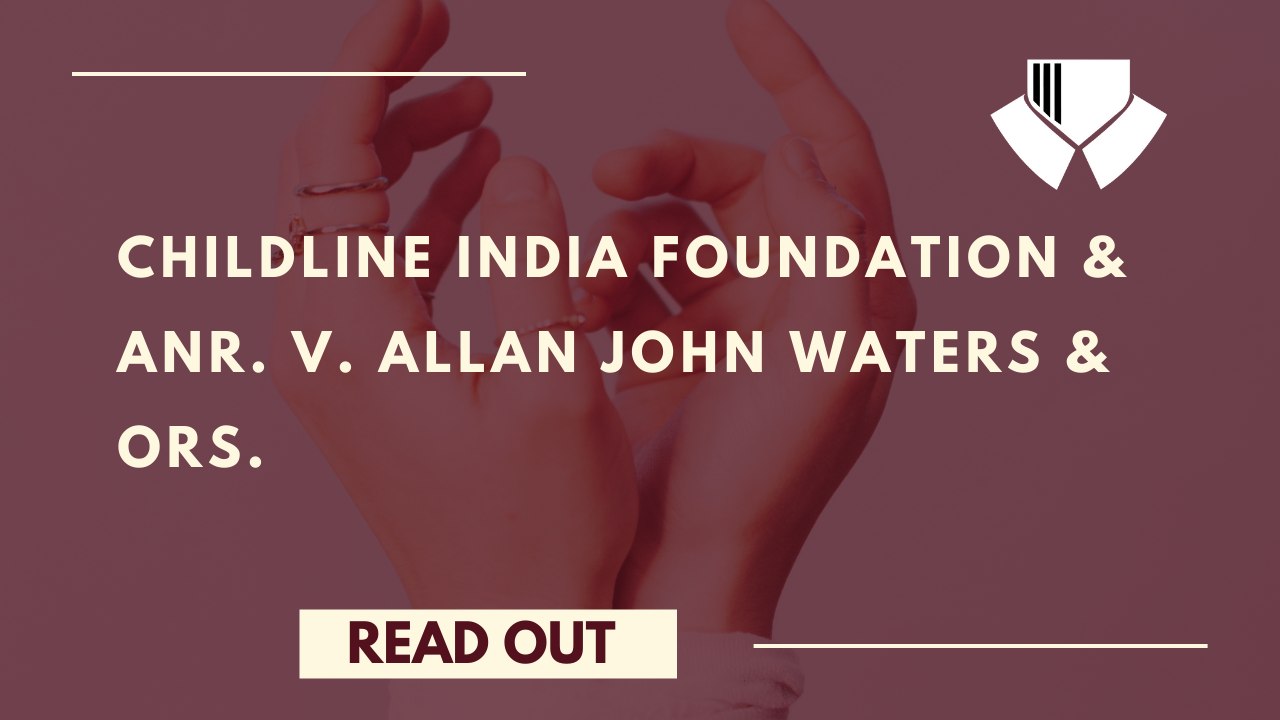This case analysis is done by Sanjeev R, a law student.
Citation; CRIMINAL APPEAL NOs. 1208-1210 OF 2008
Date of Judgement; 18th March 2011
Bench: P. Sathasivam, B.S. Chauhan
Appellant: Childline India Foundation
Respondent: Allan John Waters and others
Introduction
- Child sexual abuse (CSA) is described by the World Health Organization (WHO) as “the participation of a child in sexual activity that he or she does not fully comprehend, is unable to give informed consent to, or for which the child is not developmentally prepared and cannot give consent, or that violates the laws or social taboos of society.”
- This issue is not unique to India as technology arises. To be more precise there have been many cases that have been unnoticed or registered. Considering the shame and associated socio-cultural stigma, particularly if the abuse occurs in the setting of the family, it is not surprising that CSA is significantly underreported. As above, technology arises problems too. Social media plays a major role in creating awareness about the legislation on Protection of Children. The number of reported cases has increased in comparison to former years, and this is due to the greater knowledge of various training and awareness campaigns.
Facts
- A petition was brought before the High Court of Bombay about the plight of children at various children’s homes in Maharashtra. This petition took place in 1986.
- Various complaints were received from the child Rights Organizations like Saathi Online, Childline & CRY, etc. A committee was appointed by the High Court namely Maharashtra State Monitoring Committee on Juvenile Justice. The committee was headed by Justice Hosbet Suresh.
- A report was submitted to the High Court after visiting various Anchorage Shelters. This unconfirmed report expressed the sexual exploitation of children. There were some children residing in these Shelter homes who were sexually exploited by those who were running such homes.
- A Suo moto case has been filed with the consultation of the Maharashtra State Monitoring Committee on Juvenile Justice which was headed by Justice Hosbet Suresh. The committee submitted its report expressing its grievance on sexual exploitation of the children
- The respondents were running a Childcare home in the state of Maharashtra. In the nearby locales the respondents call upon the poor local boys and use them for their foreign clients, exhausting them physically and mentally. Various complaints were received from the child Rights Organizations like Saathi online, Childline & CRY etc.
- Based on the complaints the committee went to those anchorage shelter homes and submitted their report. According to the report the respondents were found guilty by the victims of those shelter homes. These victims explained in detail the activities that were going on in these shelters. This reflected criminal conspiracy on the part of the accused which resulted from them obtaining possession of the minor street boys and subjecting them to sexual abuse.
- The Trial Court sentenced them to imprisonment of 6 years along with the compensation of 20,000 UK Pounds.
- The respondents approached the High Court of Bombay and the High Court of Bombay passed an order of acquitting the three respondents and set aside the judgement passed by the Trial Court.
- This impugned order was challenged by the appellants in the Supreme Court of India.
Issues Involved
- Whether the impugned order passed by the High Court can be upheld?
- Whether the acquittal of the three respondents is valid and can be upheld?
Contentions
Appellants
- On 19.10.2001, the High Court passed an order for the protection of the children at Anchorage Shelter Homes. But the order was being misinterpreted by the police officials. So, Ms Maharukh Adenwala informed the court that the order of the High Court was being misinterpreted by the police, so the high court gave clarifications.
- The appellants challenged the impugned order passed by the High Court whether the acquittal of the 3 is for consideration.
- The sessions courts clearly examined the witnesses and ordered the sentence of imprisonment and a substantial amount of 20000 pounds as a fine. However, the same order of the sessions court was not considered by the High Court due to lack of evidence which resulted in the acquittal of the 3 accused t Whether the order passed by the High court be taken into consideration?
- A serious argument was projected by learned senior counsel for the accused stating that even if the allegations/statements of prosecution witnesses are acceptable, the same would not constitute an offense under Section 377 IPC.
Respondents
- An appeal before the Sessions Judge did not bring any relief to the accused and revision was filed before the High Court which set aside the order of conviction and sentence.
- The primary ground on which the High Court directed acquittal was the absence of corroboration.
- Learned senior counsel appearing for the accused submitted that except the testimony of 2 witnesses, there is no corroborative statement by any of the other boys who stayed with them in the shelter homes. First of all, there is no need to examine more victims of similar nature. Therefore, the statement of the witnesses is not so to be considered.
Judgement
- The SC observed the constitutional provisions relating to children. The Constitution provides a happy and healthy childhood that is free from all the heinous crimes and sexual abuse. Article 15(3) has provided us special provisions for women and children.
- This Court has issued elaborate guidelines on this issue. The Directive Principles of State Policy embodied in the Constitution of India provides a policy of protection of children with a self-imposing direction towards securing the health and strength of workers, particularly, to see that the children of tender age are not abused, nor they are forced by economic necessity to enter into avocations unsuited to their strength.
- Under these circumstances, the impugned judgment of the High Court acquitting all the accused in respect of charges levelled against them is set aside and the supreme court restores the conviction and sentence passed by the trial Judge.
- On the other hand, inasmuch as Allan John Waters was awarded 6 years imprisonment under Section 377 IPC while confirming their conviction, The Supreme Court directed them to serve the remaining period of sentence.
- The trial Judge is directed to take appropriate steps to serve the remaining sentence and for payment of compensation amount. For the disbursement and other modalities, the directions of the trial Court shall be implemented.
- The Juvenile Justice Act was enacted to provide for the care, protection, treatment, development and rehabilitation of neglected or delinquent juveniles.
- The Supreme Court passed the judgment of the High Court by acquitting all the accused. This decision is set aside. The Supreme Court restored the conviction passed by the trial judge. Till this period respondents were in custody for around 5 years. The Supreme Court further clarified there is no need for further imprisonment.
Conclusion
Children who have experienced abuse are more likely to struggle with trust later in life. Children who experience domestic violence, whether it be directed at them or their parents, may find it difficult in their daily life. Several laws have been passed in India to protect children from abuse and to punish those who commit such crimes. Indian laws still need to be modified in order to make it a safer place for kids to develop and thrive.


